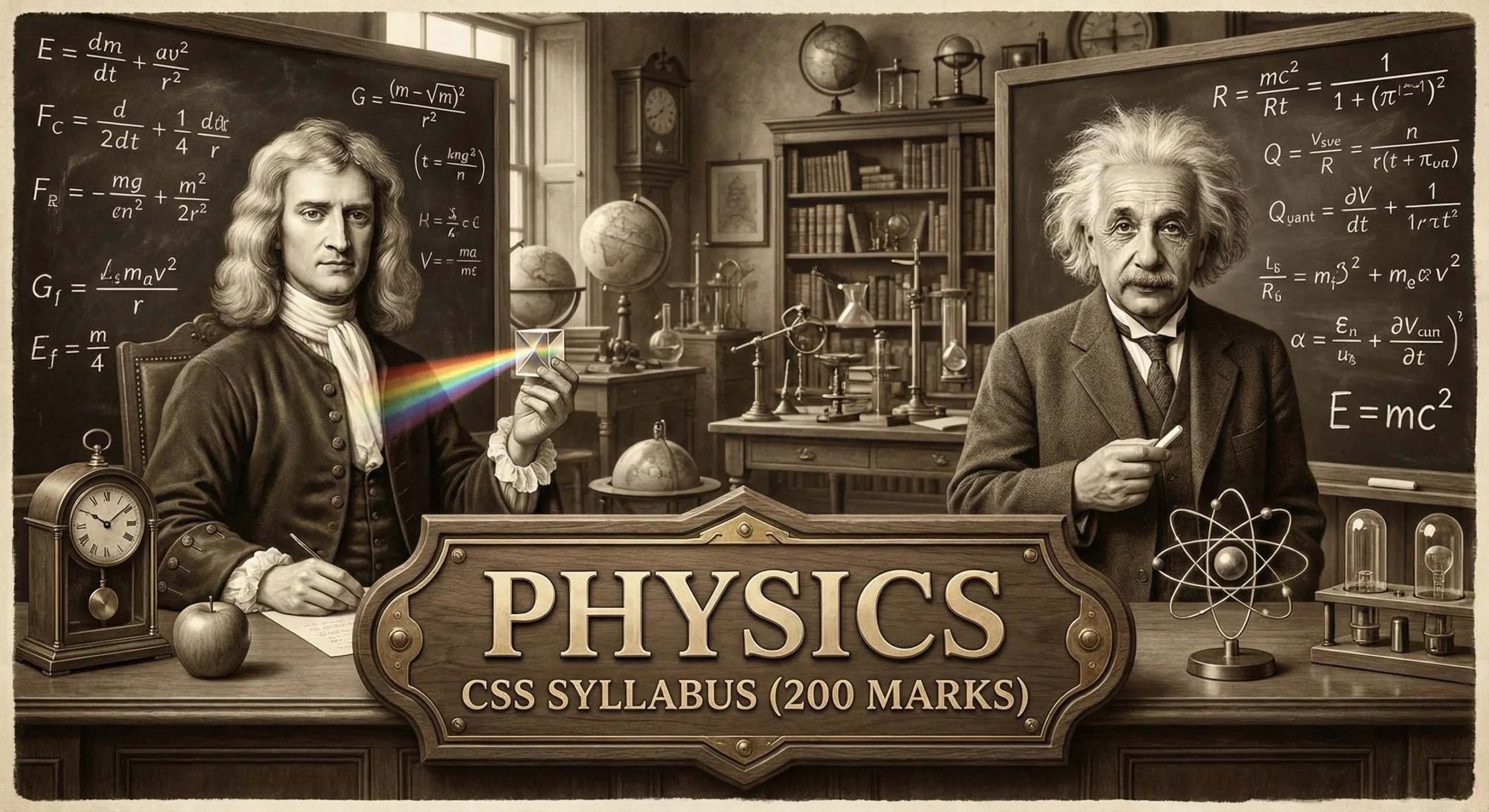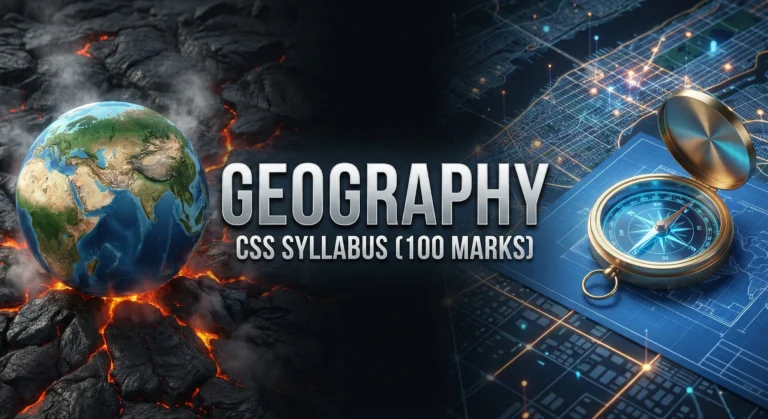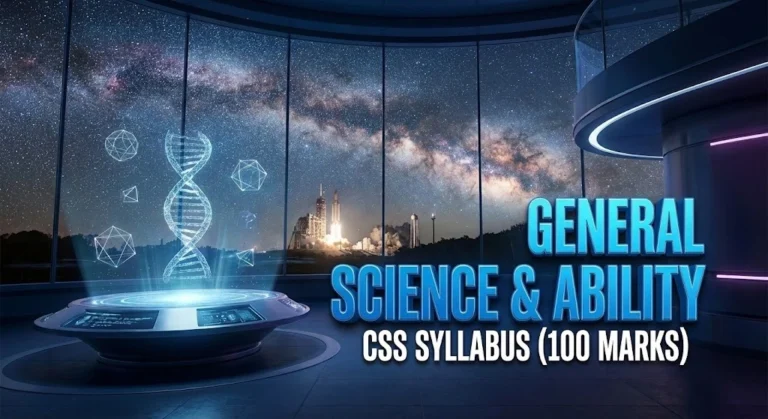PHYSICS CSS SYLLABUS (200 MARKS)
PAPER—I (Marks-100)
I. Mechanics
- Vectors
- Dot Products
- Cross Products
- Triple Products
- Gradient, Divergence, Curl, and Applications
- Newtonian Laws of Motion
- Calculus-based Approach to Kinematics, Forces, and Dynamics
- Conservation Law of Energy
- Conservation of Linear and Angular Momentum
- Dynamics of Rigid Body
- Spin and Precession
- Gyroscope
- Gravitation
- Planetary Motion and Satellites
- Kepler’s Laws
- Centripetal Forces
- Special Theory of Relativity
- Michelson-Morley Experiment and Einstein’s Postulates
- Lorentz Transformation
- Time Dilation and Length Contraction
- Equivalence of Mass and Energy
II. Fluid Mechanics
- Surface Tension
- Viscosity
- Elasticity
- Fluid Motion and Bernoulli’s Theorem
III. Waves and Oscillations, Optics
- Oscillations
- Free Oscillation with One and Two Degrees of Freedom
- Forced and Damped Oscillations
- Phenomenon of Resonance
- Simple Harmonic Motion
- Waves
- Traveling Waves and Transmission of Energy
- Phase and Group Velocity
- Standing Waves
- Basics of Sound Waves
- Optics
- Reflection and Refraction
- Interference and Diffraction
- Polarization of Waves
- Interferometer and Newton’s Rings
- Diffraction Gratings and Their Resolving Power
- Spectrometers
- Electromagnetic Waves
- Electromagnetic Wave Equation
- Normal and Anomalous Dispersion
- Coherence
- Lasers and Applications
IV. Heat and Thermodynamics
- Gases
- Perfect Gas
- Real Gas and Van der Waals Equation
- Laws of Thermodynamics
- Three Laws of Thermodynamics
- Internal Energy, Temperature, and Entropy
- Thermal Properties of Simple Systems
- Kinetic Theory of Gases
- Maxwellian Distribution of Molecular Velocities
- Brownian Motion
- Transport Phenomena
- Statistical Mechanics
- Classical Maxwell-Boltzmann Statistics and Its Application
- Bose-Einstein Statistics
- Fermi-Dirac Statistics
PAPER—II (Marks-100)
I. Electricity and Magnetism
- Electric Fields
- Electric Field Due to Point Charges
- Gauss’ Law
- Electric Potential
- Poisson and Laplace’s Equations
- Dielectric Medium and Polarization
- Capacitance
- Magnetic Fields
- Moving Charges and Resulting Magnetic Field
- Ampere’s Law
- Magnetic Properties of Matter
- Faraday’s Law of Electromagnetic Induction
- Alternating Current
- RLC Circuit
- Electromagnetic Theory
- Poynting Theorem and Poynting Vector
- Maxwell’s Equations (Integral and Differential Form)
- Scalar and Vector Potential
II. Modern and Quantum Physics
- Wave-Particle Duality
- Waves and Particles
- De Broglie’s Hypothesis
- Quantum Mechanics
- Operators and Quantum States
- Observables
- Time-Dependent and Independent Schrödinger Equation
- Angular Momentum
- Spin-1/2 Particle in a Magnetic Field
- Wave Mechanics: Particle in a Box, Tunneling, One-Dimensional Harmonic Oscillator
- Key Principles and Effects
- Heisenberg’s Uncertainty Relationship
- Indeterminacy Based on Commutation Properties of Operators
- Bohr’s Theory and Quantum Numbers (Including Electron Spin)
- Pauli’s Exclusion Principle
- Spectra of Simple Systems with One or Two Valence Electrons
- Important Experiments and Effects
- Photoelectric Effect
- Compton Scattering
- Pair Production
- Lande’s g-Factor and Zeeman Effect
- Raman Effect
III. Solid State Physics
- Crystal Lattice and Structure
- Bravais Lattice
- Free Electron Model
- Band Theory and Electron in a Periodic Potential
- Fermi Energy and Density of States
- Semiconductors
- n-type and p-type Semiconductors
- Physics of Transistor and MOSFET
- Material Properties
- Dielectric Properties
- Magnetic Properties and Origin of Magnetism
IV. Nuclear Physics
- Structure of Nuclei
- Radioactivity
- Alpha (α), Beta (β), and Gamma (γ) Decay
- Detection Methods
- Methods of Detection of Nuclear Radiation
- Mass Spectrometer
- Nuclear Energy
- Accelerators
- Phenomenon of Fission
- Reactor and Nuclear Power
- Nuclear Fusion and Its Applications
- Elementary Particles
- Elementary Particles and Their Properties
FPSC RECOMMENDED BOOKS List for PHYSICS CSS SYLLABUS
| S. No. | Title | Author |
|---|---|---|
| 1. | Perspectives of Modern Physics | A. Beiser |
| 2. | Fundamentals of Physics | Halliday & Resnick |
| 3. | Introduction to Electromagnetic Fields and Waves | D. Corson & P. Lorrain |
| 4. | Heat and Thermodynamics | D. Zemansky |
| 5. | Introduction to Quantum Mechanics | D. Griffiths |
| 6. | Modern Physics | Serway, Moses, Moyer |
| 7. | Solid State Physics | C. Kittel |
FPSC Official PHYSICS CSS SYLLABUS
Here is the link to the PHYSICS CSS SYLLABUS on the FPSC official website







